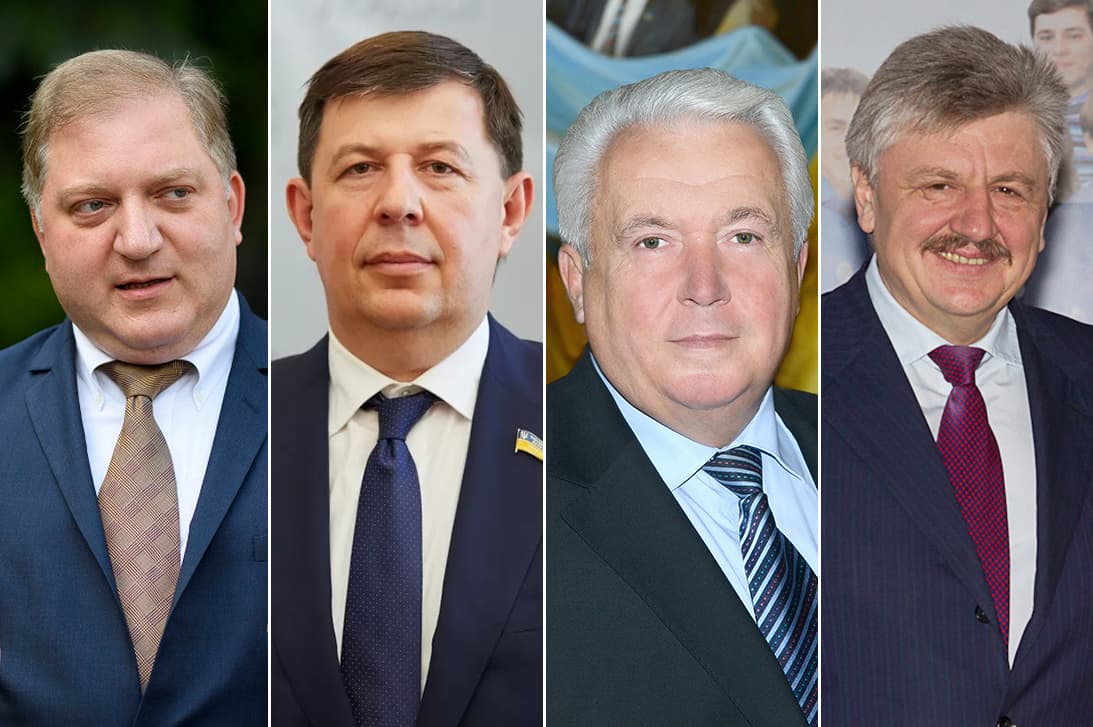US Treasury announces sanctions against 4 pro-Kremlin Ukrainians

The U.S. Department of the Treasury updated its list of sanctioned individuals on Jan. 20 by including four Ukrainian pro-Kremlin politicians to its Specially Designated Nationals and Blocked Persons List.
The Kremlin-linked individuals were sanctioned because they “engaged in Russian government-directed influence activities to destabilize Ukraine,” according to the Treasury's statement released on Jan. 20.
Those on the list are two lawmakers representing the pro-Kremlin Opposition Platform faction – Taras Kozak and Oleh Voloshyn. Two former high-ranking members of the now-defunct Party of Regions – Volodymyr Oliynyk and Vladimir Sivkovich – are also now on the list.
"Russia has directed its intelligence services to recruit current and former Ukrainian government officials to prepare to take over the government of Ukraine and to control Ukraine’s critical infrastructure with an occupying Russian force," the statement reads.
According to the U.S. government, "at the heart of this effort are Kozak and Voloshyn, two current Ukrainian members of parliament from the party led by Victor Medvedchuk, who is already subject to U.S. sanctions for his role in undermining Ukrainian sovereignty in 2014."
The sanctions will now freeze all property and interests in property that are subject to U.S. jurisdiction and belong to the targeted individuals.
“The United States is taking action to expose and counter Russia’s dangerous and threatening campaign of influence and disinformation in Ukraine,” said Deputy Secretary of the Treasury Wally Adeyemo. “We are committed to taking steps to hold Russia accountable for their destabilizing actions.”
Kremlin pawns
The four sanctioned individuals are all well-known in Ukraine for spreading a pro-Kremlin narrative.
In the U.S., the four are best known for assisting sanctioned lawmaker Andrii Derkach in his attempt to interfere in the 2020 U.S. presidential election.
"Since at least 2016, Russian agents have even sought to influence U.S. elections by spreading disinformation, sowing discord among U.S. audiences, and falsely denigrating U.S. politicians and political parties," the statement published by the U.S. Treasury reads.
The first name on the list is Kozak, the former official owner of the pro-Kremlin media empire in Ukraine. Kozak's ally Medvedchuk was believed to be the real owner. Both denied it.
In February, Ukraine's National Security and Defense Council imposed sanctions on Medvedchuk and Kozak and blocked three pro-Kremlin TV channels – 112 Ukraine, ZIK and NewsOne.
In May, Medvedchuk and Kozak were charged with high treason for colluding with the Russian government to extract natural resources in Crimea, the Ukrainian peninsula that has been illegally occupied by Russia since the 2014 military invasion. According to Ukraine's prosecutors, Medvedchuk re-registered his Kyiv-based company according to Russian laws to continue extracting gas in the peninsula.
According to the U.S. government, "Kozak supported the FSB’s plan to denigrate senior members of Ukrainian President Volodymyr Zelensky’s inner circle, falsely accusing them of mismanagement of the COVID-19 pandemic."
"Throughout 2020, Kozak worked alongside FSB intelligence agents," the statement reads.
Voloshyn, the other current lawmaker, has been one of the most outspoken pro-Kremlin politicians in Ukraine.
"Voloshyn has worked with Russian actors to undermine Ukrainian government officials and advocate on behalf of Russia," the statement reads.
The U.S. government had also accused Kozak and Voloshyn of amplifying false narratives around the 2020 U.S. presidential elections.
The two former Ukrainian politicians were also part of a large Kremlin-led disinformation campaign.
Sivkovich was a deputy prime minister and deputy secretary of the National Security and Defense Council under pro-Kremlin ex-President Viktor Yanukovych. He has been charged with abusing his power by cracking down on protesters during the 2013-2014 EuroMaidan Revolution, which ousted Yanukovych.
According to the U.S., "In 2020, Sivkovich worked with a network of Russian intelligence actors to carry out influence operations that attempted to build support for Ukraine to officially cede Crimea to Russia in exchange for a drawdown of Russian-backed forces in the Donbas, where separatists continue to receive support from Russia."
A similar role was allegedly assigned to Oliynyk.
"In 2021, Oliynyk worked at the direction of the FSB to gather information about Ukrainian critical infrastructure," the U.S. Treasury writes.
Ex-Lawmaker Oliynyk co-sponsored the infamous “dictatorship laws”, which led to a crackdown on civil liberties during the 2014 EuroMaidan Revolution.









